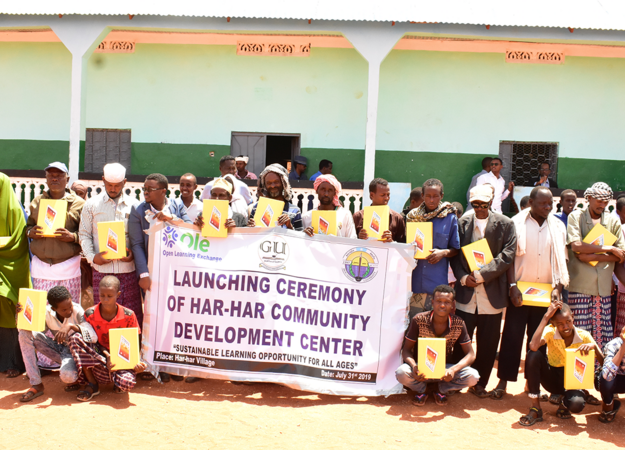The Open Learning Exchange (OLE) and Mogadishu University, Somalia’s premier institution of higher learning, have signed a three-year Partnership Agreement to establish Community Development Centers in at least 30 Somali villages within the next three years. This is just a beginning.

This will directly benefit at least 4,000 young Somalis, and many others, living in rural communities that currently lack electricity and internet connections. Using OLE’s open source Planet Learning software, young Somali women and men will be able to choose a personal career pathway they can begin developing in their village.
With support by a grant from IIE PEER, the program will encourage high achievers along their career pathways to learn how they can advance to the university level and beyond. These will be places where communities become peaceful and thriving magnets for young women and men. Rather than fleeing their villages, they will choose to create meaningful work there and thrive.
The formal Partnership Agreement signed in May 2019 joins OLE and MU in an ambitious “hub and spoke” program promoting community renewal in rural Somalia. Funding is in place to support the hiring and training of the Somali staff who are leading the customized curriculum design and program implementation in the pilot village of Har Har. This village in northern Somalia was selected for its relatively peaceful condition and the enthusiasm of the villagers for this initiative. A new and prestigious National Community Development Council, which held its inaugural session in June, is responsible for overseeing the development of a national Community Development Network reaching every community In each of Somali’s six states.
The initial five Center courses (literacy, numeracy, health care worker training, entrepreneurship, and democracy) are each led by a dedicated MU faculty member supported by an OLE subject matter expert. A baseline survey of potential participants in Har Har has been completed. This documents the enthusiasm of community members for providing tangible for their Har Har Community Development Center They have added to the list careers in fishing, agriculture, construction, and handicrafts.
A huge impediment in the strengthening of under-developed and devastated communities is the lack of communications infrastructure. Ten years in development, the PLANET Learning system empowers communities without the Internet to use top quality information that helps them take control of their futures. Text, audio and video content is downloaded to a low-cost local server and made available via a wireless Intranet to digital tablets. Planet has been used successfully by Somali refugees in the Dadaab, Kenya, refugee camp over the last five years, and the lessons learned there are now benefiting Somalia.
The work performed by course participants is communicated via satellite from the local server to regional hubs for review and response by education professionals at Galkayo University and Mogadishu University. Constructive guidance, needed program improvements, progress measurement, badges and certifications for course performance, and career-related internships, are included in the Personal Dashboard of every Planet member. As access to the Internet becomes ubiquitous and the cost affordable, Plant works seamlessly to connect in real time people living in the most remote locations.
The success of Somalia’s national Community Development Network will be measured in meaningful work created, individuals and communities thriving socially and economically, and refugees welcomed home. This success will attract institutional and government funding – including Somalia government funding - in support of establishing Community Development Hubs in each state, connecting each community in a permanent national Network.
Written by Richard R. Rowe, Ph.D. | CEO, OLE.

